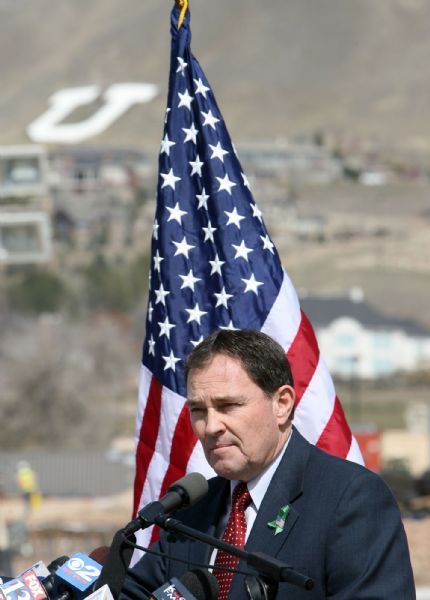This is an archived article that was published on sltrib.com in 2010, and information in the article may be outdated. It is provided only for personal research purposes and may not be reprinted.
The fight over health reform will extend from Congress to the courts shortly after President Barack Obama signs the sweeping legislation today.
Utah Attorney General Mark Shurtleff announced the state would join Florida and others to file a constitutional challenge arguing the federal government can't force people to buy insurance.
His move came just a few hours before Gov. Gary Herbert signed a state law banning what is known as an individual mandate, which is enforced by a fine levied against those who refuse to buy coverage. Now that state law conflicts directly with the new federal law, Utah has standing to sue.
Shurtleff called the requirement "unprecedented" and a "federal overextension." He said the legal challenge involving at least 10 Republican attorneys general is "ready to roll" as soon as Obama signs the health reform bill, which the House narrowly passed late Sunday. The House also approved a second bill of modifications that still needs Senate approval. The lawsuit includes other challenges to health reform, but Shurtleff would not disclose them until it is filed in court.
The individual mandate is expected to take effect in 2014. Those who fail to buy insurance would initially face a $95 fine growing to $695 for an individual in 2016. The fine for a family would be capped at $2,085 or 2.5 percent of household income. The bill exempts people with religious objections and American Indians.
For months, Republicans, led by Utah Sen. Orrin Hatch, have questioned the legal reasoning behind the mandate, saying the federal government has never forced people to buy a good or service and if it is allowed to stand it would mean Washington is all-powerful.
In an op-ed published in January, Hatch and Shurtleff argued the requirement is "a threat to liberty itself."
Hatch commended Shurtleff on the suit Monday and promised his support.
"This is just one of the constitutionally suspect provisions in this legislation," Hatch said. "Congress has overstepped its legal authority."
But Rep. Jim Matheson, D-Utah, who voted against the bill, doesn't think this argument will get very far in the courts.
"I don't think there is a very strong argument that it is unconstitutional," he said.
Neither does the White House.
"My advice from counsel is that we'll win these lawsuits," said White House press secretary Robert Gibbs. "I think there's pretty long-standing precedent on the constitutionality of this."
Supporters of the health reform bill cite their own legal scholars who say the mandate is clearly within established law, relying on Congress' ability to regulate commerce between states. While anticipating a lawsuit, White House health reform director Nancy-Ann DeParle recently said she is confident courts will uphold the new law.
Leading Democrats also argue the mandate is a necessity because when everyone has insurance the risks are spread broadly, making it financially feasible to ban unpopular insurance practices such as dropping people who get sick or charging women more for coverage. While Matheson believed the overall bill was lacking, he said he saw value in having everyone covered so people no longer have to foot the bill for the uninsured.
Insurance companies fought for the mandate, which will deliver them millions of new customers, though they think the fines in the bill are too small.
Utah's largest insurance companies on Monday side-stepped the question of constitutionality.
"That's a legal question," said Daron Cowley, spokesman for Intermountain Healthcare's SelectHealth, one of Utah's largest insurance companies.
Industry lobbyist Kelly Atkinson said the question of government mandates is best left to lawmakers, but he acknowledged, "If health insurance is going to be more affordable, everyone has to have skin in the game. And right now the healthiest individuals don't because they don't see any benefit."
Said Atkinson: "I'm not a lawyer. I'm not qualified to say what's constitutional. But if you asked me if [the bill] advocated sound insurance principles, my answer is yes."
Beyond the policy debate, Gibbs also challenged Republicans' sincerity on the issue, pointing to past legislation where they had endorsed a nearly identical mandate, specifically singling out Utah Sens. Hatch and Bob Bennett.
"I think Utah is one of the states that's thinking about doing this," Gibbs said of the lawsuit during his daily briefing. "Senator Hatch and Senator Bennett have both been on legislation requiring some level of individual responsibility like this."
Hatch and Bennett sponsored a 1993 health reform bill that included an individual mandate, and Bennett is the co-author of a 2009 health reform alternative that would also have required everyone to buy insurance.
But what might have once been a Republican-backed idea has now become one of the GOP's primary targets. Last week, Idaho became the first to challenge health reform when Republican Gov. Butch Otter signed legislation requiring the state's attorney general to sue the government over the mandate. Others have followed suit, including South Carolina and Texas.
Planning for a legal challenge, Shurtleff encouraged Utah's Legislature to include its own mandate ban as part of a broader anti-health reform bill, which also requires state agencies to inform the Legislature when implementing any federal health reforms. It is a milder version of a bill the Legislature considered to opt out of the reforms entirely.
The impending lawsuit shouldn't cost Utah much money, Shurtleff said, because the expense is divided by the states involved on a basis of population. He added he made the decision to join the effort on his own.
"We want Governor Herbert's blessing, but we didn't feel like we had to ask his permission," Shurtleff said.
He has Herbert's blessing.
"In light of the concerns shared by many people in Utah and around the country, it is entirely appropriate that the attorney general and his counterparts across the nation consider every option on this issue," Herbert said. "A lawsuit puts into action concerns over a federal government overreach that is unprecedented and possibly unconstitutional."
mcanham@sltrib.com" Target="_BLANK">mcanham@sltrib.com
Kirsten Stewart contributed to this article.
Florida, Alabama, South Carolina, Nebraska, North Dakota, Pennsylvania, South Dakota, Texas, Washington and Utah. Idaho also promises to sue, but hasn't signed on to the Florida suit yet.







